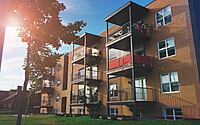6 Tips You Need to Know Before Renting a Property
If you’re thinking about renting a property, there are a few things you need to know first. From budgeting to understanding the lease agreement, these six tips will help set you up for success. Read on to learn more.
Research the area you want to live in
Before signing a lease for any property, it is essential to do your research first. Check for crime statistics in the area and look up recent comments about any problems tenants may have had with their landlords. Consider whether the place is safe enough for you to feel comfortable living there. Also, ensure it has everything you need nearby, such as grocery stores, public transportation, parks, and nightlife. Seasoned agents offering Singapore rentals suggest you consider the cost of living in the area you’re thinking of, as this can affect how much of your monthly income will be left to spend on other items. All of these aspects should be taken into consideration before making a decision. An informed search will help ensure that you find a property that satisfies all your needs and provides a safe environment.
Know your credit score and history
Knowing your credit score and history cannot be ignored before renting a property. It may not feel like it right now, but this information will have an enormous impact on whether or not you are approved for a lease. A good credit score assures the landlord that you can afford rent payments, bills, and other necessary living costs. A poor credit score could result in being rejected for the lease or accepted with higher fees, deposits, and interest added. Research your credit score and recent transactions before looking for properties to provide yourself with the best chance of securing a rental property.
Have a budget in mind
When you are looking to rent a new property, setting a budget beforehand is essential. It is important to be realistic and honest about what you can afford each month. Knowing your budget will help you narrow down your options, as well as assist you in avoiding properties that exceed what you can spend every month. Before committing to anything, check that the total amount you would be paying for rent is within an amount that fits comfortably into your budget for other expenses, such as food and entertainment. Knowing how much you can reasonably spend on renting a home will prevent potential financial problems further down the line.
Be prepared to put down a security deposit
When renting a property, tenants should be prepared to pay a security deposit equal to one month’s rent. This is done up-front before the tenant moves in and is held by a landlord or agency as insurance against any financial damage or liabilities caused by the tenant not following their obligations in the rental agreement. In many cases, this security deposit will be refunded after moving out, provided no adverse circumstances were present in the property when leaving. Therefore, tenants must scrutinize the property upon moving in and take necessary precautions throughout their tenancy to ensure that any damages are dealt with promptly and correctly.
Find a reputable landlord or property management company
When looking for a new place to rent, it’s essential to know that you’re entrusting your home and potential financial security to a reputable landlord or property management company. Taking the time upfront to research can save you from future issues. First and foremost, it’s essential to read reviews from my past tenants to get an idea of the quality of service offered. Secondly, ask for references from other tenants or homeowners who’ve worked with the companies in question, as these are likely the most reliable sources of information about their performance. Ultimately, taking a few extra steps can help ensure that you end up with a reputable landlord or property management company.
Read the lease agreement carefully
Before signing a lease agreement, ensure you understand all the conditions and terms of living in the property. Do not forget to read through the contract carefully and ask any questions that may arise if something isn’t clear. It is crucial to find out extra details such as whether pets are allowed, how long potential repairs will take, who is responsible for covering utility bills, and other applicable consequences if you should break the lease early. Knowing all the rules your landlord sets before getting into a rental agreement guarantees both parties get what they expect from the lease, preventing conflicts down the line.
Your hunt for an ideal rental property can take a lot of effort and time, but if you follow the tips above, you’ll be much better informed before taking the plunge. Preparing yourself thoroughly is your best bet for finding a great rental property. Rest assured that there is a place for everyone, and doing your due diligence will help you find the ideal one.
- by Matt Watts










